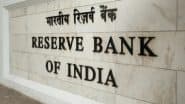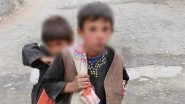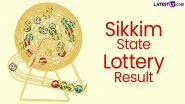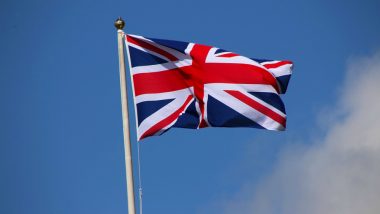London, July 22: The UK government on Thursday announced further sanctions on five individuals under the UK's Global Anti-Corruption sanctions regime, including the Vice-President of Equatorial Guinea and an Iraqi governor.
Under the sanctions regime, the UK imposes asset freezes and travel bans against sanctioned individuals to ensure they are no longer able to channel their money through UK banks or enter the country. China Warns Australia Against Sanctions Over Uyghurs Rights Violations in Xinjiang, Says 'We Will Respond in Kind'.
This is the second set of Global Anti-Corruption sanctions and targets corrupt individuals who are seen as guilty of lining their own pockets through misappropriation, with their greed causing untold damage to the countries and communities they exploit, the UK Foreign Office said.
“The action we have taken today targets individuals who have lined their own pockets at the expense of their citizens,” said UK Foreign Secretary Dominic Raab.
“The UK is committed to fighting the blight of corruption and holding those responsible for its corrosive effect to account. Corruption drains the wealth of poorer nations, keeps their people trapped in poverty and poisons the well of democracy,” he said.
Teodoro Obiang Mangue, Vice President of Equatorial Guinea and son of the current President, has been sanctioned for his involvement in the misappropriation of state funds into his own personal bank accounts, corrupt contracting arrangements and soliciting bribes, to fund a lavish lifestyle inconsistent with his official salary as a government minister. This included the purchase of a USD 100 million mansion in Paris and a USD 38 million private jet.
Nawfal Hammadi Al-Sultan has been listed for his involvement in serious corruption in his role as Governor of Nineveh province, Iraq, where he misappropriated public funds intended for reconstruction efforts and to provide support for civilians, and improperly awarded contracts and other state property.
Al-Sultan is currently serving a combined five-year prison sentence in Iraq for corruption offences, including wasting five billion Iraqi dinars (approximately GBP 2.5 million) through fictitious public works.
Kudakwashe Regimond Tagwirei is sanctioned for profiting from misappropriation of property when his company, Sakunda Holdings, redeemed government of Zimbabwe Treasury Bills at up to 10 times their official value. His actions accelerated the deflation of Zimbabwe's currency, increasing the price of essentials, such as food, for Zimbabwean citizens.
Alex Nain Saab Morán and Alvaro Enrique Pulido Vargas are on the list for exploiting two of Venezuela's public programmes which were set up to supply poor Venezuelans with affordable foodstuffs and housing. They benefited from improperly awarded contracts, where promised goods were delivered at highly inflated prices.
Their actions caused further suffering to already poverty stricken Venezuelans, for their own private enrichment. The UK Foreign Office said action against them follows the first tranche of sanctions under the Global Anti-Corruption sanctions regime in April, which targeted 22 individuals involved in serious corruption cases in Russia, South Africa, South Sudan and Latin America.
"Over 2 per cent of global GDP is lost to corruption every single year and today's action demonstrates the UK's ongoing commitment to the fight against corruption,” the Foreign Office said.
Since Raab launched the Global Anti-Corruption sanctions regime in April, in total the UK has now sanctioned 27 individuals around the world involved in serious corruption. The financial restrictions also apply to any entities owned or controlled by the individuals designated.
(The above story is verified and authored by Press Trust of India (PTI) staff. PTI, India’s premier news agency, employs more than 400 journalists and 500 stringers to cover almost every district and small town in India.. The views appearing in the above post do not reflect the opinions of LatestLY)













 Quickly
Quickly


